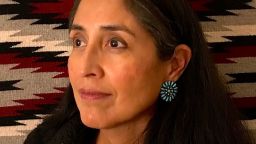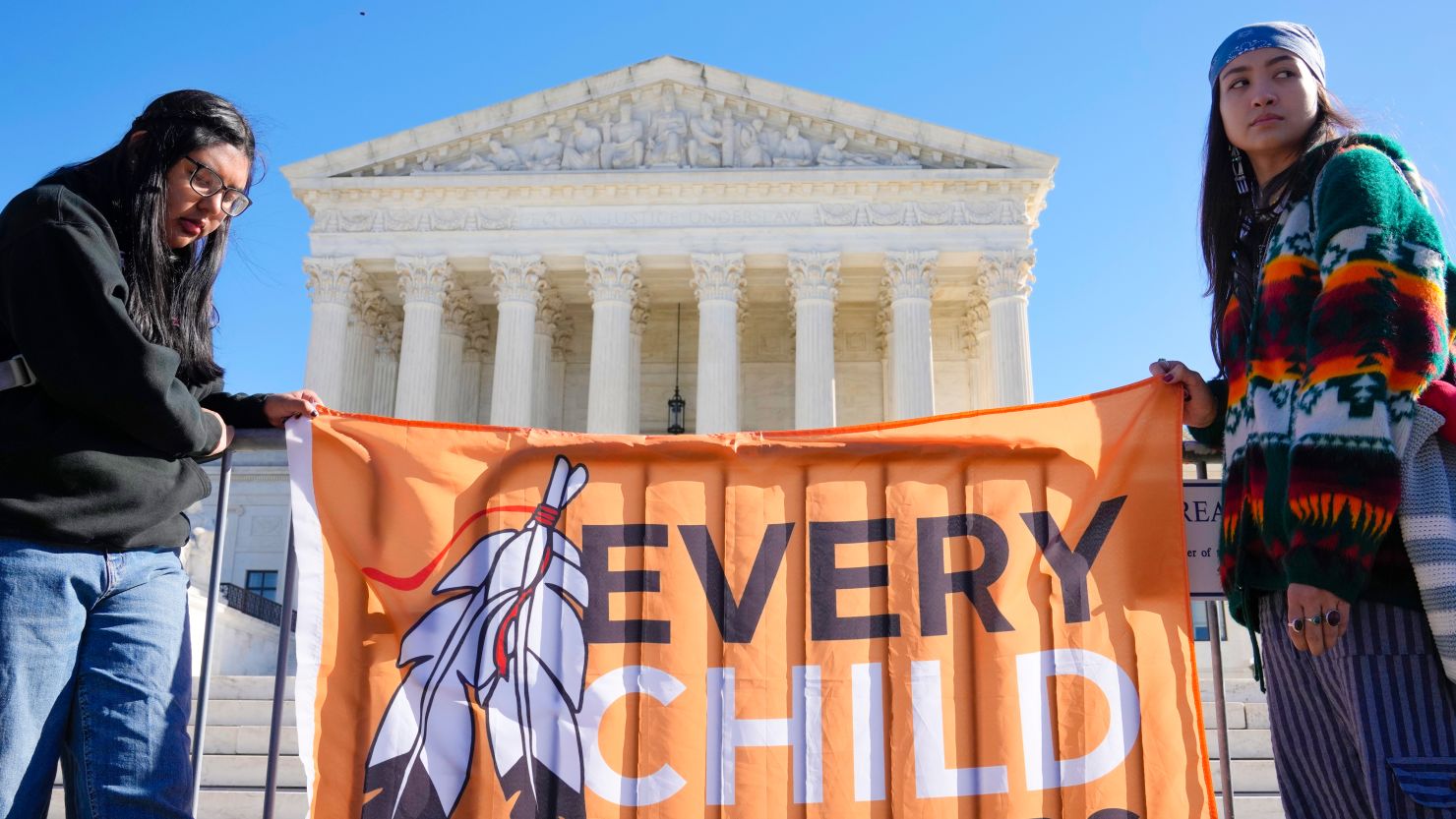Editor’s Note: Hilary C. Tompkins, a member of the Navajo Nation, served as the Solicitor of the US Department of the Interior during the Obama administration. This is an update of her essay which first published in November, 2022. The views expressed here are her own. Read more opinion at CNN.
My adoption papers said my mother was “very attractive” and that my “grandmother has some education and is considered to be an intelligent woman.” My father, who was listed as “Plains,” was described as having “hair with a slight tendency to wave.”
These small nuggets of information from my adoption papers were my only connection to my birth family. Only much later in life, as a young adult taking Native American studies at Dartmouth College, did I learn that I also had a legal connection with the Navajo Nation as a citizen of the Tribe.

I’m like many Native Americans who were placed in White families under the Department of the Interior’s Indian Adoption Project in the 1960s and 1970s.
As with the placements of Indian children in boarding schools, this program removed Native children from their Tribes without justification and assimilated them into mainstream America. When I met my birth family as a young adult, one of my aunts held me and cried, saying the last time she held me I was a baby and she had told the hospital officials that she and my extended family would take care of me, but to no avail. I was taken away and put up for adoption anyway.
Recognizing that the continued existence of Tribal Nations was at stake because of the loss of up to 35% of their children, Congress outlawed this practice in 1978 with the passage of the Indian Child Welfare Act (ICWA). At the time, placement with White families was estimated to be at 90%.
In November, the US Supreme Court held oral arguments in a closely watched case, Haaland v. Brackeen, to decide whether the Indian Child Welfare Act is unconstitutional because it favors the adoption of Native children by Native families.
On Thursday, the Court left the decades-old law intact. The placement of Native American children with Native families or tribes can continue to be prioritized in child custody proceedings, it said, rejecting challenges brought by several adoptive parents. I could not be more pleased.
The states of Texas, Louisiana and Indiana, along with non-Native parents seeking to adopt Native children, held the position that ICWA amounts to racial discrimination because it has nothing to do with the “ability of Indians to govern themselves.” They argued that the states and non-Native parents should be able to decide the placement of Native children free of consideration of their tribal status because there is no political interest of the Tribes at stake.
And opponents of the Indian Child Welfare Act even went a step further, saying that the law went against the best interests of Native children by imposing standards that make it harder for them to be adopted into stable, loving homes.
As a Native person who was adopted into a White family before the implementation of ICWA, that’s not the way I see it. I can attest firsthand, as a citizen of both the United States and the Navajo Nation, that ICWA is not about race.
I grew up in southern New Jersey, but I always knew I was Navajo. Born in Zuni Pueblo, New Mexico, I was separated from my family with only a few papers as evidence of my Tribal status.
By all outward appearances, my life today gives the impression that the Indian Adoption Project was a success. I was placed in a family that loved me. I received an exemplary education. I live a comfortable, middle class life. I have enjoyed professional success, having served as Solicitor of the Department of the Interior, the third ranking position in the department – the very federal agency that set my course in life. Yet despite these blessings, the Indian Adoption Project left me adrift, a foreigner in my own country.
Upon my return to the Navajo Nation some 30 years ago, my sense of loss was overwhelming. The Navajo Nation is a different world: Navajo is frequently spoken there and the laws and way of living are based on Navajo traditions.
There is no separation of Navajo spirituality from Navajo sovereignty. One foundational principle is ke’ – kinship – which is rooted in a vast clan system. I didn’t know my clan and couldn’t speak the language. Nor did I understand the complex and traditional laws of Navajo society. The loss of my culture was not just personal, but political.
I tried to make up for my losses, learning some of the language, attending our traditional ceremonies and working for the Navajo Nation Department of Justice. But despite my best efforts, I couldn’t catch up. I can vote in our elections but I don’t understand the stump speeches. I can’t run for office as I am not a fluent Navajo speaker. I reconnected with my birth family, but I have never felt fully integrated into Navajo society.
ICWA recognized that in order to have functioning tribal governments, you need the next generation of tribal citizens to be part of tribal political society. Taking away Native children threatens tribes’ future because the loss of their kids jeopardizes Tribes’ ability to be political sovereign entities.
The law gives a preference for placing a Native child with extended family members, members of its Tribe or members of another Tribe – a priority that can make it harder for a White family to adopt. It requires state courts to notify the Tribe about the child, and to have them indicate the preferred placement – or to say placement with a particular non-Native family is okay.
During oral arguments in November, two of the justices indicated that they understood how high the stakes are for Tribal Nations. Justice Neil Gorsuch observed during oral arguments that in passing the law, Congress understood that ICWA is “essential to [the] self-preservation of Indian tribes.” And Justice Kagan recognized that “the political entity is itself being threatened because of the way decisions on the placement of children are being made.”
If ICWA had been in place when I was adopted, my Tribe would have been involved in my adoption. Navajo tribal authorities would have had a say in my adoption had I been adopted under the provisions of the law. I could have maintained a connection with my relatives – even if I had ended up with White parents. I still could have been adopted by a non-Native family, but my adoptive family might have been able to connect with my extended family or others, fostering a connection with my Tribe. But because I was placed for adoption prior to the existence of ICWA, I had to reclaim my connection with my Tribe all on my own.
My family and I eventually found each other by serendipity when I was living on the Navajo reservation. In middle age, I have come to accept who I am – a Jersey girl born into the Salt Clan. I have overcome the pain and loss. But I wouldn’t wish my experience on the children of Tribal citizens today. We cannot fail Native children again as we have failed them in the past.
The Supreme Court honored tribal nations and their citizens with their ruling. I am thankful that future generations of Native children will have the opportunity to learn about their role in tribal self-governance and sovereignty and will not have to face the struggle that Native adoptees have had to face in the past.
Native children deserve the opportunity to be citizens of both the United States and Tribal Nations. I pray that they will never be the subject of another social experiment based on the decisions of government officials who haven’t walked in the shoes of the First Americans.
This updates an essay originally published on November 21, 2022.





